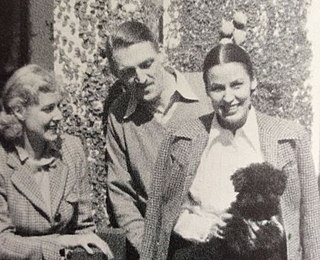A Quote by Walter Lippmann
One might point to the great illumination that has resulted from Freud's analysis of the abracadabra of our dreams. No one can any longer dismiss the fantasy because it is logically inconsistent, superficially absurd, or objectively untrue.
Related Quotes
Surely we all occasionally buy books because of a daydream we're having - a little fantasy about the people we might turn into one day, when our lives are different, quieter, more introspective, and when all the urgent reading, whatever that might be, has been done. We never arrive at that point, needless to say.
The point is this: If God does not exist, then life is objectively meaningless; but man cannot live consistently and happily knowing that life is meaningless; so in order to be happy he pretends life has meaning. But this is, of course, entirely inconsistent—for without God, man and the universe are without any real significance.
He is not simply looking into the mirror because he is transfixed by what he sees. Rather, the artist’s success depends as much as anything on his powers of detachment, on de-narcissizing himself… Freud… studied his own dreams not because he was a “narcissist,” but because he was a student of dreams. And whose were at once the least and most accessible of dreams, if not his own?
Mythologies were the earliest dreams of mankind, and in the psychotic delusions of his patients, Jung believed he was encountering those dreams again. Freud, too, believed that the psyche retained archaic vestiges, remnants of our earlier mental world. But for Freud these were a burden we were forced to repress. Jung instead would see them as a reservoir of vital energy, a source of meaning and power from which, through the over-development of our rational minds, modern mankind has become divorced.
Paul Davies takes us on a logically and rhetorically compelling modern search for human agency. This outstanding analysis, well informed by naturalistic views of our evolved affective nature, is the kind of philosophical work that is essential for a field to move forward when ever-increasing findings from modern science are inconsistent with traditional philosophical arguments. This book is for all who wish to immerse themselves in the modern search for free will. It is steeped in the rich liqueur of current scientific and philosophical perspectives and delusions.
...a point is reached where the self is so completely aligned with the still-point that it can no longer be moved, even in its first movements, from this center. It can no longer be tested by any force or trial, nor moved by the winds of change, and at this point the self has obviously outworn its function; it is no longer needed or useful, and life can go on without it.
Mind is nothing but dreams and dreams - dreams of the past, dreams of the future, dreams of how things should be, dreams of great ambitions, achievements. Dreams and desires, that is the stuff mind is made of. But it surrounds you like a China Wall. And because of it the fish remains unaware of the ocean.
He's a man who... well, one of the great things about Shakespeare is that his characters are inconsistent, and that's something I think makes him a writer above most writers because inconsistency is what we, as people, are full of. We maybe don't see it in ourselves too often, but we are inconsistent.

































